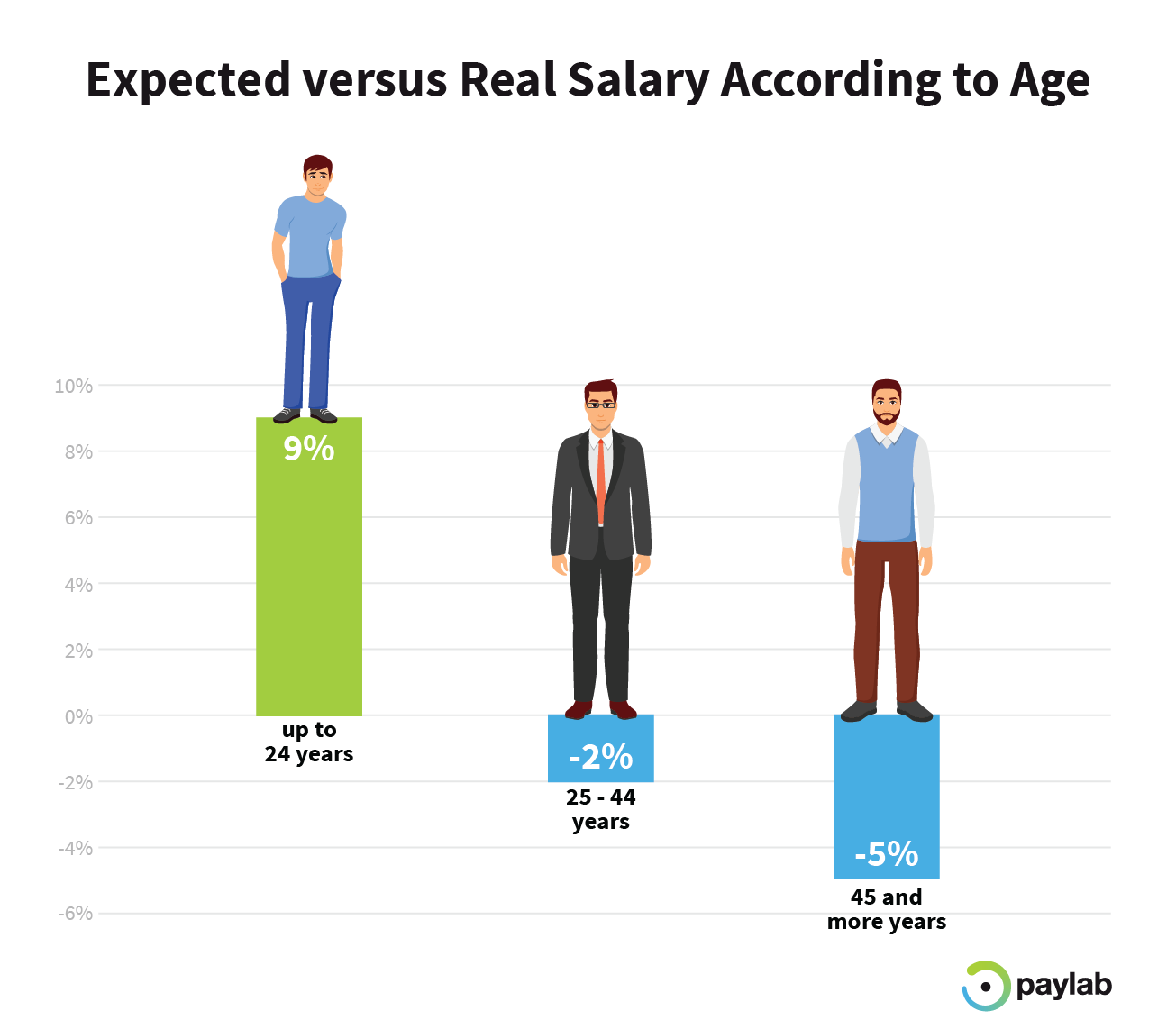Expected vs Real Salaries – What to Consider During a Career Change?
23 January 2019

Analysis from Paylab, an international salary portal, suggests that people who are entering the labour market for the first time have the most ambitious expectations with regard to their salaries. The older the job applicants are, the more realistic are their salary expectations. In addition, they have a tendency to undervalue their potential salary at a job position with which they had no prior experience. The most ambitious salary expectations can be seen with employees under 24 years old. On average, Generation Z – that is, current graduates and labour market newbies – expect a salary that is about 9 percent higher than real salaries in this age group.
Paylab has analysed 73,093 salary questionnaires with expected salaries for each age group in 12 European countries. Generally, people aged under 35 mostly look for information about salaries for job positions with which they have no experience. This is also related to the fact that the current generation of millennials sees their career as a more dynamic thing compared to the preceding generations, and wish to try several roles at work.

Having zero experience in a job position isn't always a hurdle
People relate the beginning of the year with various challenges - including the desire for a change in their career pathway, which might bring new experiences to their working life. There are employees who would like to make a radical change in their job position and try their luck with a new position in which they haven't got any experience yet. They evaluate their salary expectations with the Paylab service, which allows them to compare their expectations with the reality for the given position.
Having zero experience in a job position doesn't always need to be a hurdle. Often it is enough to possess the required skills, such as speaking a foreign language or being communicative. With the growing shortage of workers on the labour market, employers are lowering their high expectations. Today, many companies can provide in-house training for particular jobs, and the necessary support and help when changing jobs.
How can I find out the salary for a job position if I have no experience?
Salary portals associated with the Paylab network offer an online service which allows workers on the labour market to find out the average salary for a given job position even if they have no experience. After having selected the desired position, visitors can set the WORK EXPERIENCE field to "I have not worked in this position yet". When filling in the questionnaire, they can then simply specify the expected salary and compare it with reality. That said, the input data - the expected salaries - does not affect the final calculation of the salaries which the users see on the website. The figures shown on the website only contain the real salaries of employees with experience.
What should I keep in mind when negotiating salary in a position with which I have no experience?
To know the value of a certain job position is especially important when talking with HR managers at job interviews, but also when planning one's own personal finances. As the old saying goes, fortune favours the prepared mind.

The applicants' idea of the salary for the position which they are considering often differs from the real figures. In many fields, the expectations are too high, or too low at times. Here, it is necessary to keep in mind the fact that the average salary for the position is generated from the data of both junior and senior employees, with differences in the size and focus of the companies that employ them. The average salary thus serves for informative purposes only. At the job interview, it is also necessary to ask about the aspects that may affect your final income or even cut some of your existing expenses. Paylab has prepared six areas that you should consider.
If you wish to look at a more detailed overview of salaries for a particular position, the localised Paylab website at the end of the complete salary questionnaire offers a more detailed salary analysis to buy, which lets you see the changes in the salary depending on experience and education.
1) Working time (working shifts, overtime, working in the evening, at night or at the weekend)
An employee's salary is dependent on the length of his or her working hours. At the interview, be sure to ask about how many hours an employee needs to work to get the basic salary, and if the employer pays for overtime work. It is good to know ahead of time what portion of the working time is constituted by evenings or weekends, given the fact that there are compulsory wage supplements for such kind of work. Wages for part-time positions are also calculated according to the hours worked.
2) Using company devices and facilities for personal purposes
The comfort of the employee is also affected by the fact whether he or she can use company devices or facilities for personal purposes. Most often, these include a company phone, laptop or vehicle. At times, it can involve the possibility to utilise the company premises or technical facilities of the company. At some operations, it is possible to buy discarded material at a favourable price from the company, or - in the case of craft businesses - to use the workshop machinery for personal purposes as well. Many employers offer various employee discounts for their goods and services.
3) Frequency of business travel
If travel is included in the job description, it falls into the category of business travel. If you are sent on a business trip by your employer, you are entitled by law to a per diem travel allowance. This covers food and travel costs, and if the business trip spans over several days, the accommodation costs are covered as well. The allowance for international travel is more financially attractive.
4) The employer's benefit scheme
The most frequent benefit is the variable component of the salary. Ask about the financial benefits offered by the employer and the conditions that need to be met to obtain them. In particular, you could ask about monthly bonuses, thirteenth salaries or end-of-the-year bonuses. Companies usually give bonuses to employees who improve quality, reduce company expenses, innovate, recommend new and talented employees, acquire new clients and achieve more than their set targets. It is also helpful if the employee acts as an ambassador of the company culture.
The following table shows the number of employees that receive a monthly bonus in particular countries. The countries in which this benefit is most common are the Czech Republic, Slovakia, and Slovenia.
5) The amount of responsibility at work
A basic rule applies to job interviews: you should only talk about the salary after the other party introduces you to all of your duties and responsibilities. Especially in smaller companies, it happens that job positions accumulate, which means that a number of jobs fuse into one position. Depending on the extent and amount of responsibility, you can estimate the extent and amount of stress related to it. J
6) The trial period versus your salary after its successful completion.
If you are to start in a new position with no prior experience, the employer has no guarantee that the employee is the right one. It is thus logical to accept a compromise - you agree on an initial salary, which may be increased to the desired level after the trial period. That way, both parties can be satisfied. In managerial positions, the trial period may be longer than usual. At the interview, ask about the possibility of a pay raise after its successful completion. You can also ask to have the salary change incorporated into the work contract.


